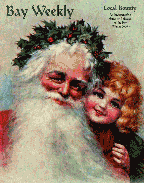|
||
|
Bay Reflections Peace on EarthWithout us, it will never comeby Sylvia OlivaOn the wall close to my bed hangs a full-page ad from The Washington Post dated Tuesday, October 10, 2006. A very young African woman, head covered and slightly bowed, chin in her hand, seems to be gazing down almost emotionless, until a closer look reveals the deep sadness in her eyes. The caption: “When rape is the weapon, the wounds never heal.” It continues: “Genocide is happening right now in Darfur … 400,000 people dead … 2.5 million driven from their homes … untold thousands raped, tortured and terrorized.” I’m an ordinary 63-year old retired teacher’s aide living with my husband in Heritage Harbour. I do ordinary things like cooking, cleaning and a couple of volunteer jobs. I enjoy nature and quiet time. As for broader concerns, it’s a struggle to prioritize and fit a few in. Family naturally comes first. For the past three years, however, my sense of family has grown, evidenced by the picture near my bed. I guess a seed was planted when, as a young woman, I came across a book about the Holocaust with the unspeakable, unforgettable photographs and the oft-repeated oath, Never again! I’m outraged that genocide does happen again and again. It’s been happening for four long years in the little rural villages of Darfur, Sudan in the Horn of Africa. We’ve heard the disturbing reports about the predawn strikes of Janjaweed militias, the capturing of innocent civilians, the mutilating, killing and gang rape, the looting and setting villages afire, the bombardments from government helicopters. Then massive displacements of people trekking through the desert, ending up in huge refugee camps without enough water, food, shelter, sanitation, medical help or even safety. The lives of the valiant humanitarian workers are threatened, too, and many have been forced to leave. It is, in the words of Kofi Annan, secretary general of the United Nations, “little short of hell on earth!” Learning of all this in late 2003, I couldn’t not take action. I deepened my understanding at www.SaveDarfur.org, and linking up with this and several other organizations, I discovered there were many things I could do to help. I began with my Peace & Social Concerns Committee of my local Quaker community, formalizing our commitment to work to end the genocide and to urge others to do likewise. The whole community of Annapolis Friends Meeting approved our Minute Against Genocide in Darfur. Perhaps your church, synagogue, or mosque received a copy, as we mailed it to 100 religious organizations from Glen Burnie to Cape St. Claire, Shady Side, Mitchellville and Odenton. Then we supported the Million Voices for Darfur campaign, in which over a million people signed a postcard to President George W. Bush. As I canvassed door to door for signatures, I enjoyed meeting many of my neighbors. Next came the April 2006 rally on the National Mall. How heartening to see all the people who care, especially all the young people. “This is one world, and we are all one family,” said Cardinal McCarrick, the Roman Catholic prelate of Washington, D.C. “What happens to the people of Darfur happens to us.” Then Illinois Sen. Barack Obama’s words: “Paralysis in the face of genocide is wrong. … If we care, the world will care.” In August, I made lobbying visits: to Sen. Barbara Mikulski, Sen. Paul Sarbanes and Congressman Ben Cardin. Each time, a Quaker Friend or a neighbor accompanied me. The good relationships begun with each legislative aide continue by correspondence. The lobbying, as well as a public presentation on Darfur I gave last October at our meeting house, are firsts, not ordinary for me, and my husband and friends stood behind me. But any act — wearing the green wristband, writing a letter to the editor, making a short phone call, a donation or a prayer — is not without effect. Done with love, they witness to something basic to our common humanity: compassion and the longing to live together in peace. May peace come to Darfur and to the world. Sylvia Oliva reflects from Heritage Harbour in Annapolis. This is another first: her first published story. |
||
|
© COPYRIGHT 2004 by New Bay Enterprises, Inc. All rights reserved. |


